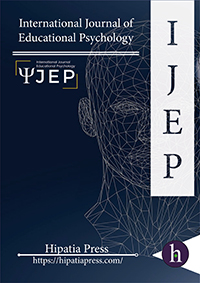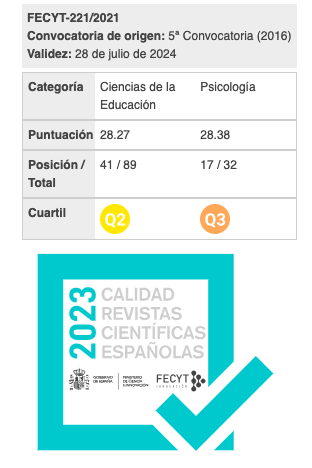Out of the Ghetto: Psychological Bases of Dialogic Learning
Keywords:
Downloads
Abstract
The conception of learning in the information society has been affected by the dialogic turn of educational psychology. The effective teachinglearning processes respond more and more to the communicative conception of learning in which dialogue and interaction are key elements. In this framework, the dialogic learning emerges as an interdisciplinary conception that collectscontributions from psychology of education, particularly from sociocultural theory, and from those contributions that have located learning as the result of social interaction. This article presents the psychological basis of dialogic learning on the basis of which it is developed this eminently communicative and transformative conception. Specifically, it focuses in five of the seven principles of the dialogic learning of which it is illustrated with the voices of teachers, families and students, by means of the collected data in an elementary school of an underprivileged area in the south of Europe.
Downloads
References
Alexander, R. (2004). Towards dialogic teaching: Rethinking classroom talk. York: Dialogos.
Google Scholar CrossrefAlexiu, T. M., & Sorde, T. (2011). How to turn difficulties into opportunities: Drawing from diversity to promote social cohesion. International Studies in Sociology of Education, 21(1), 4962.
Google Scholar CrossrefAubert, A., Flecha, A., García, C., Flecha, R., & Racionero, S. (2008). Aprendizaje dialógico en la sociedad de la información. Barcelona: Hipatia.
Google Scholar CrossrefAubert, A., García, C., & Racionero, S. (2009). El aprendizaje dialógico. Cultura & Educación, 21(2), 129139.
Google Scholar CrossrefAubert, A. (2011). Moving beyond social exclusion through dialogue. International Studies in Sociology of Education, 21(1), 6375.
Google Scholar CrossrefAubert, S., Elboj Saso, C., García Carrión, R., & García López, J. (2010). Contrato de inclusión dialógica. Revista Interuniversitaria De Formación Del Profesorado, 24(67), 101111.
Google Scholar CrossrefBakhtin, M. (1981). The dialogic imagination: Four essays. Austin: University of Texas Press.
Google Scholar CrossrefBeck, U. (1998). La sociedad del riesgo: Hacia una nueva modernidad. Barcelona: Paidós.
Google Scholar CrossrefIJEP International Journal of Educational Psychology 1(1) 67
Google Scholar CrossrefBeck, U., Giddens, A., & Lash, S. (1997). Modernización reflexiva. política, transición y estética en el orden social moderno. Barcelona: Península.
Google Scholar CrossrefBruner, J. S. (2000). La educación, puerta de la cultura. Madrid: Visor. Bruner, J. S. (1990). Acts of meaning. Cambridge, Mass..: Harvard
Google Scholar CrossrefUniversity Press.
Google Scholar CrossrefDewey, J. (1930). Democracy and education. New York: Macmillan. Díez, J., Gatt, S., & Racionero, S. (2011). Placing immigrant and
Google Scholar Crossrefminority family and community members at the school's centre: The role of community participation. European Journal of Education, 46(2), 184196.
Google Scholar CrossrefFlecha, R. (2000). Sharing words: Theory and practice of dialogic learning. Lanham, M.D: Rowman & Littlefield.
Google Scholar CrossrefFlecha, R. (2011). The dialogic sociology of education. International Studies in Sociology of Education, 21(1), 720.
Google Scholar CrossrefFlecha, R., Gómez, J., & Puigvert, L. (2001). Teoría sociológica contemporánea. Barcelona: Paidós.
Google Scholar CrossrefFreire, P. (1970) Pedagogy of the oppressed. New York: Continuum. Freire, P. (1997). A la sombra de este árbol. Barcelona: El Roure
Google Scholar CrossrefCiencia.
Google Scholar CrossrefGalton, M., Hargreaves, L., & Pell, T. (2009). Group work and whole
Google Scholar Crossrefclasse teaching with 11 to 14 yearolds compared. Cambridge
Google Scholar CrossrefJournal of Education, 39(1), 119140.
Google Scholar CrossrefGarcía, R., Duque, E., & Mircea, T. (2010). Sociocultural
Google Scholar Crossreftransformation and the promotion of learning. Journal of
Google Scholar CrossrefPsychodidactics, 15(207222)
Google Scholar CrossrefGatt, S., Ojala, M., & Soler, M. (2011). Promoting social inclusion
Google Scholar Crossrefcounting with everyone: Learning communities and INCLUDED.
Google Scholar CrossrefInternational Studies in Sociology of Education, 21(1), 3347. González, N., Moll, L., & Amanti, C. (2005). Funds of knowledge:
Google Scholar CrossrefTheorizing practices in households and classrooms. Mahwah, New
Google Scholar CrossrefJersey: Lawrence Erlbaum Associates.
Google Scholar CrossrefHabermas, J. (1987). The theory of communicative action. V.2.
Google Scholar Crossreflifeworld and system: A critique of functionalist reason. Boston:
Google Scholar CrossrefBeacon Press.
Google Scholar CrossrefINCLUDED Consortium. (2009). In European Commission (Ed.),
Google Scholar CrossrefActions for success in schools in europe. Brussels: European
Google Scholar CrossrefRocío García Out of the guetto
Google Scholar CrossrefCommission.
Google Scholar CrossrefLave, J., & Wenger, E. (1991). Situated learning. legitimate peripheral
Google Scholar Crossrefparticipation. Cambridge, M.A: Cambridge University Press. Martín Rojo, L., & Alcalá Recuerda, E. (2003). ¿Asimilar o integrar?
Google Scholar Crossref:Dilemas ante el multilingüismo en las aulas. Madrid: Ministerio de Educación, Cultura y Deporte. Secretaría General de Educación y Formación Empresarial. Centro de Investigación y Documentación Educativa.
Google Scholar CrossrefMead, G. H. (1934). Mind, self and society. Chicago: University of Chicago Press.
Google Scholar CrossrefMead, G. H. (1973). Espíritu, persona y sociedad: Desde el punto de vista del conductismo social. Barcelona: Paidós.
Google Scholar CrossrefMercer, N. (2000). Words and minds : How we use language to think together. London ; New York: Routledge.
Google Scholar CrossrefMercer, N., Wegerif, R., & Dawes, L. (1999). Children's talk and the development of reasoning in the classroom. British Educational Research Journal, 25(1), 95111.
Google Scholar CrossrefMoll, L., Amanti, C., Neff, D., & Gonzalez, N. (1992). Funds of knowledge for teaching: Using a qualitative approach to connect homes and classrooms. Theory into Practice, 31(2), 132141.
Google Scholar CrossrefMoll, L. C., & González, N. (2004). Engaging life: A funds of knowledge approach to multicultural education. In J. Banks, & M. C. Banks (Eds.), Handbook of research on multicultural education (pp. 628634). New York: Macmillan.
Google Scholar CrossrefOliver, E., de Botton, L., Soler, M., & Merrill, B. (2011). Cultural intelligence to overcome educational exclusion. Qualitative Inquiry, 17(3), 267276.
Google Scholar CrossrefRacionero, S., & Padrós, M. (2010). The dialogic turn in educational psychology. Journal of Psychodidactics, 15(2), 143162.
Google Scholar CrossrefSánchez, M. (1999). La vernedasant martí: A school where people dare to dream. Harvard Educational Review, 69(3), 320335.
Google Scholar CrossrefSoler, M., & Flecha, R. (2011). From Austin’s speech acts to communicative acts: Perspectives from Searle, Habermas and CREA. Revista Signos, 43(2), 363375.
Google Scholar CrossrefSternberg, R. J., & Wagner, R. K. (1986). In Sternberg R. J., Wagner R. K.(Eds.), Tacit knowledge and intelligence in the everyday world. Cambridge: Cambridge University Press.
Google Scholar CrossrefIJEP International Journal of Educational Psychology 1(1) 69
Google Scholar CrossrefTellado, I., & Sava, S. (2010). The role on nonexpert adult guidance in the dialogic construction of knowledge. Journal of Psychodidactics, 15(2), 163176.
Google Scholar CrossrefDownloads
Published
Almetric
Dimensions
How to Cite
Issue
Section
License
All articles are published under Creative Commons copyright (CC BY). Authors hold the copyright and retain publishing rights without restrictions, but authors allow anyone to download, reuse, reprint, modify, distribute, and/or copy articles as the original source is cited.
















